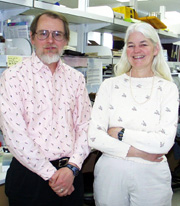 For cell biologists Margaret Wheelock, Ph.D., and Keith Johnson, Ph.D., the 10th floor of the Lied Transplant Center is a second home.
For cell biologists Margaret Wheelock, Ph.D., and Keith Johnson, Ph.D., the 10th floor of the Lied Transplant Center is a second home.
From there, the husband-and-wife team has a clear view of research progress at UNMC and clear goals for how their research could someday help people with oral cancer.
Drs. Wheelock and Johnson, both professors in the UNMC College of Dentistry, have several grants from the National Institutes of Health and the U.S. Department of Defense to study basic cell biology and how cells adhere to one another.
Drs. Wheelock and Johnson were drawn to UNMC by the opportunity to spend more time doing research. Before coming to UNMC, they spent a significant part of their time teaching at the University of Toledo in Ohio.
“They’re extremely talented researchers and they really love research,” said John Reinhardt, D.D.S., dean of the UNMC College of Dentistry. “We’re very lucky to have them. Their presence enhances the dental college’s research program and cements our research role at UNMC. Few dental schools have as strong a connection to a major cancer center, as we have here with the Eppley Cancer Center.”
The goal, Dr. Reinhardt said, is to put together a designated oral cancer center. “We have the right people,” he said. “That’s exciting for the future.”
|
Methods used to treat oral cancers (surgery, radiation, and chemotherapy) are disfiguring and costly. Oral cancers are associated with cigarette, cigar or pipe smoking, use of smokeless tobacco, and excessive use of alcohol. |
In conducting experiments to understand the process of oral cancer, Drs. Wheelock and Johnson are studying cadherins, which are involved in the mechanism whereby cells recognize one another. Cancer becomes deadly when cancer cells metastasize, or spread to other parts of the body. Drs. Wheelock and Johnson think cadherins play a role in causing cancer to spread.
“If you can modify the information in the cells, maybe that will decrease the cell’s metastatic potential,” Dr. Wheelock said.
They ultimately hope to find a clinical application for their work.
Drs. Wheelock and Johnson are collaborating with UNMC head and neck surgeons Bill Lydiatt, M.D., and Dan Lydiatt, M.D., as well as College of Dentistry oral pathology researchers Don Cohen, D.M.D., and Indraneel Bhattacharyya, D.D.S.
One of their goals is to help clinical scientists identify tumors that are likely to spread into the jawbone.
“The clinicians have all these burning questions,” Dr. Wheelock said. “If we could say ‘this cell does this or that,’ the patient could be saved a lot of trauma, for example, by not taking bone out unnecessarily.”
Drs. Wheelock and Johnson say their goals are to stay funded, to understand why some cancers are invasive and to make an impact. Their team consists of: Jim Wahl, research assistant professor; Meena Jaggi, postdoctoral fellow; students Emhonta Johnson, Young Kim and Chris Theisen; and technicians Bryan Katafiasz, Jennifer Oiler and Bob Svoboda.
The couple’s longtime interest in science began in rural Iowa and Minnesota. Dr. Wheelock, a native of Cresco, Iowa, and Dr. Johnson, a native of Trimont, Minn., met in 1977 while in graduate school in Minnesota. Before going to Toledo, they did research in Philadelphia at the Wistar Institute, an independent nonprofit biomedical research institute.
Dr. Wheelock, whose mother was a nurse, went into research and teaching after college. Dr. Johnson served in the Peace Corps for two years, taught high school science and math and spent a short time as an administrator for an industrial manufacturer in quality assurance. He found his love in science.
“This is real stuff, interesting stuff,” he said.
Photo: Keith Johnson, Ph.D., and Margaret Wheelock, Ph.D., in one of their labs in the Lied Transplant Center.